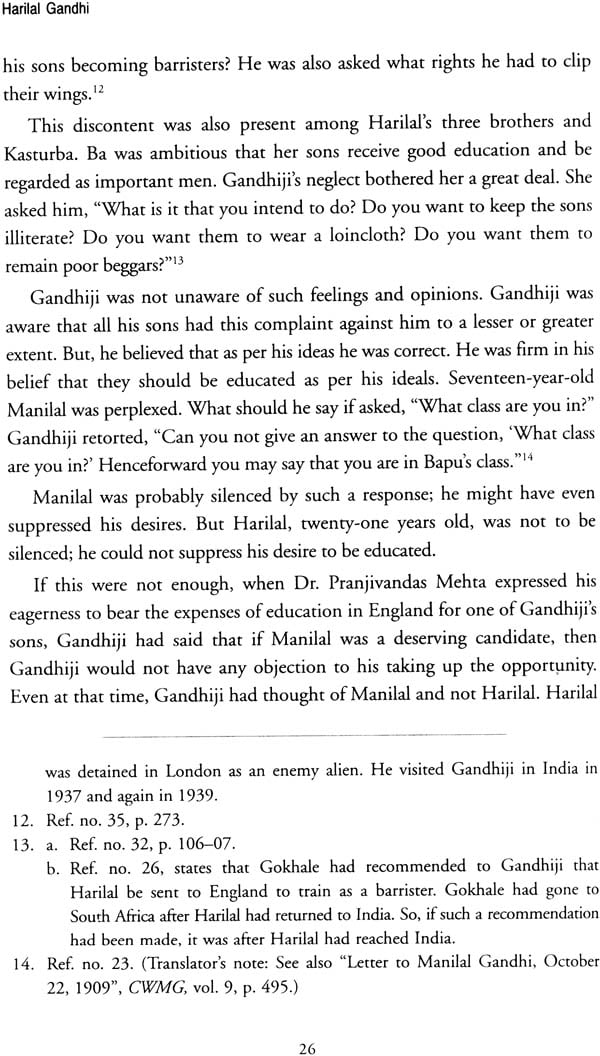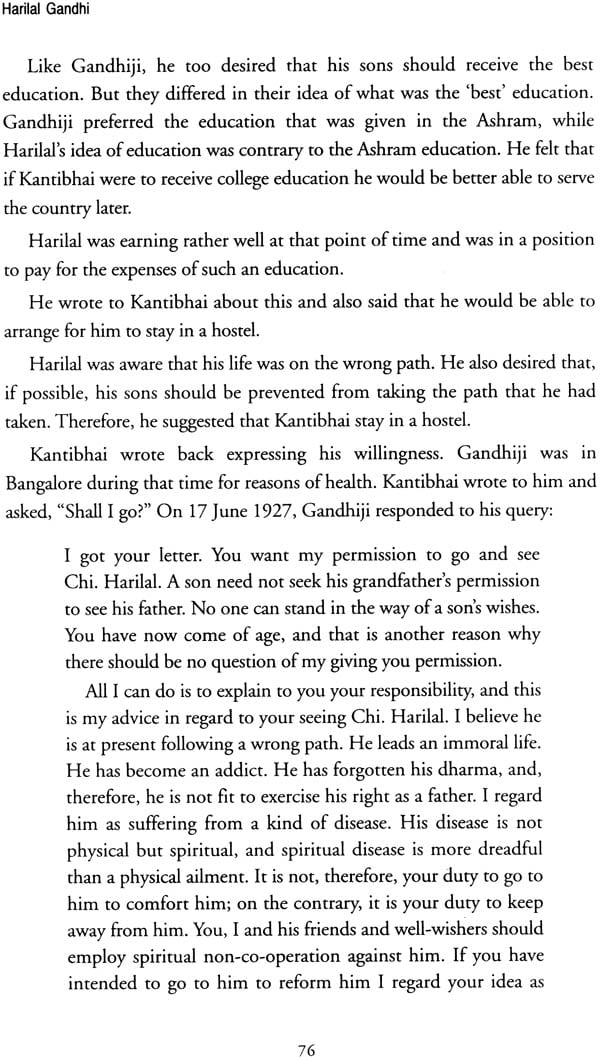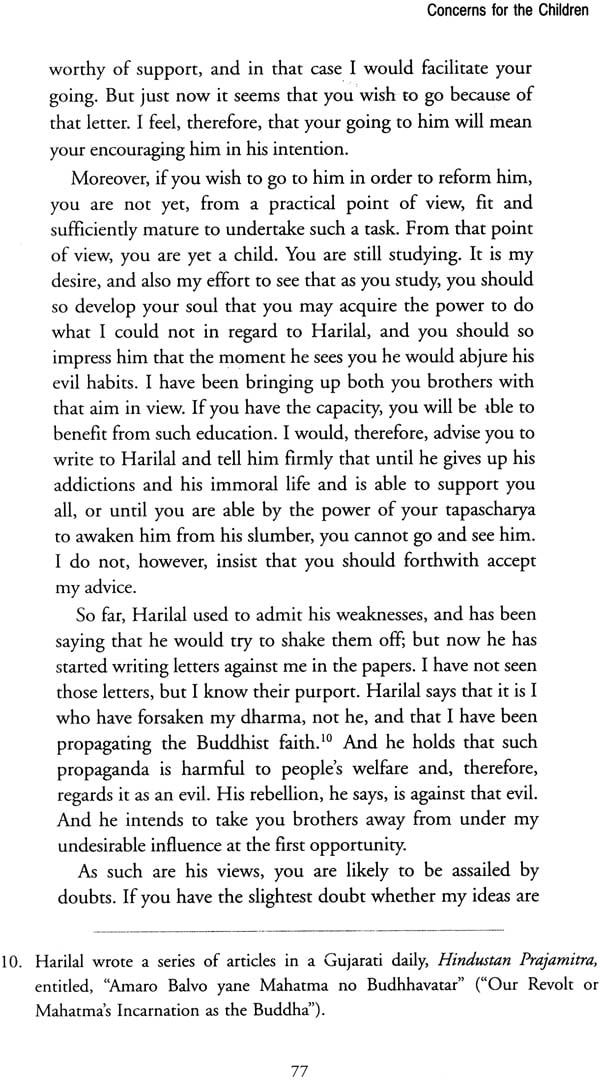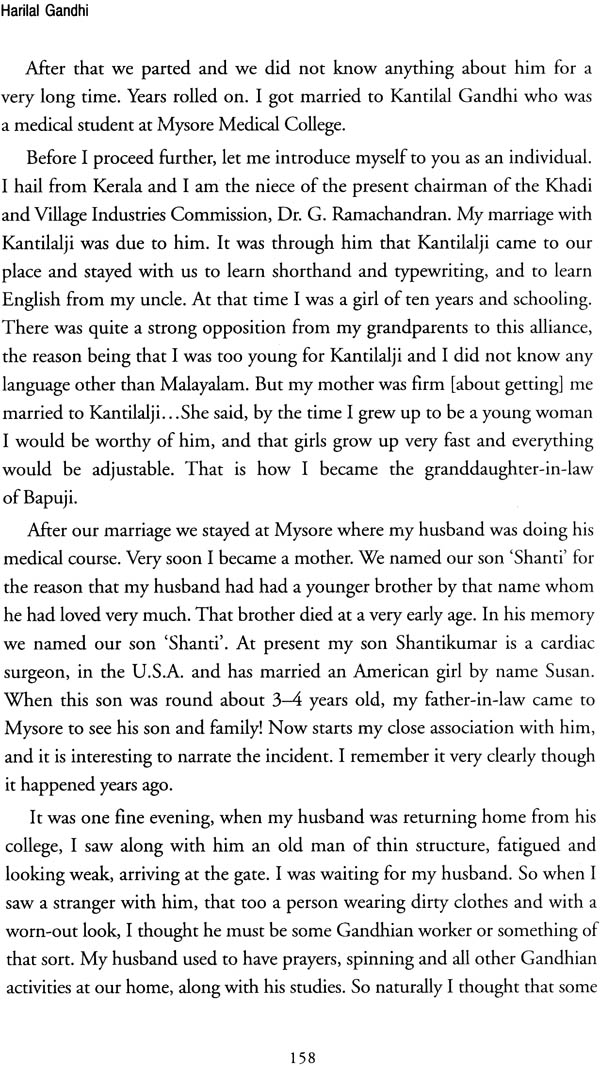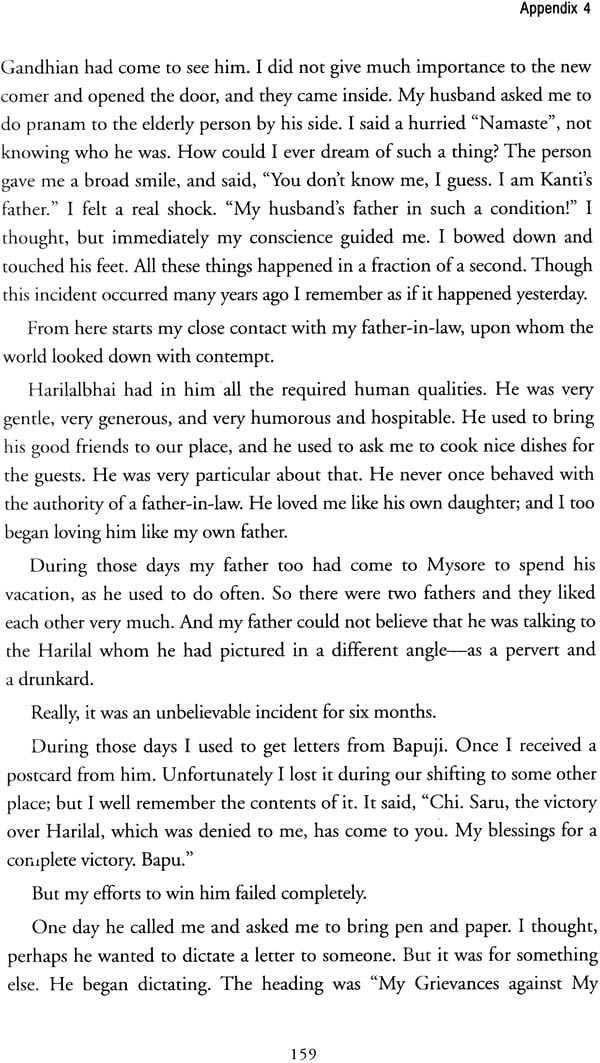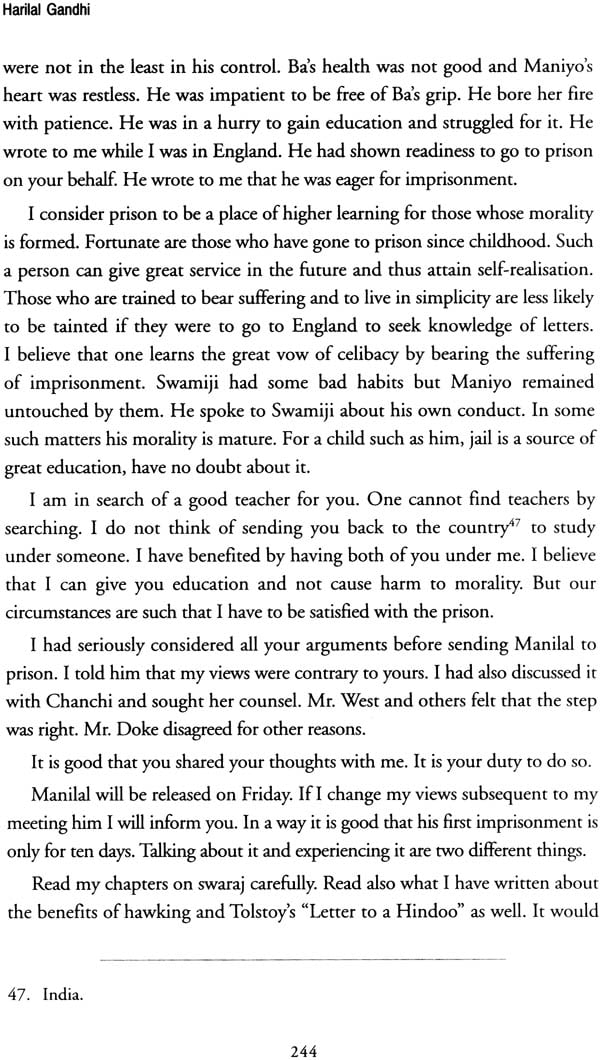
Harilal Gandhi: A Life
Book Specification
| Item Code: | IDJ821 |
| Author: | Chandulal Bhagubhai Dalal & Edited & Translated by Tridip Suhrud |
| Publisher: | Orient Longman Pvt. Ltd. |
| Edition: | 2007 |
| ISBN: | 9788125033790 |
| Pages: | 290 |
| Cover: | Paperback |
| Other Details | 8.5" X 5.5" |
| Weight | 320 gm |
Book Description
Back of the Book
Harilal Gandhi, the eldest son of Mohandas and Kasturba Gandhi, is a mysterious, fascinating figure. We know very little about his life. Paradoxically, Harilal has also been the subject of much speculation on recent times. Chandulal Bhagubhai Dalal's life of Harilal Gandhi is the only full-length biography available on him. One of the finest outcomes of Gandhian scholarship, it is moved by an acute desire to undo a wrong and to rescue a life from a world of perpetual rumours and shadows.
Chandulal Dalal's biography reconstructs a life from letters, family records and archives of the Sabarmati Ashram, and old files of newspapers. He wrote letters and conversed with the family of Harilal Gandhi. His narrative is documentary in style; the language unambiguous, sparse, unadorned. He is empathetic and compassionate towards all - Harilal, Gandhiji, Kasturba and other members of the Gandhi family - but his commitment is only to truth.
Tridip Suhrud's English translation of this Gujarati work seeks to go beyond the act of just translation. Apart from the life of Harilal Gandhi as chronicled by Chandulal Dalal, Tridip Suhrud has included twelve appendices constituting hitherto unpublished letters and related material. Chandulal Dalal's biography, combined with the Translator's Appendices, contains the complete published, unpublished and archival material available on Harilal Gandhi.
This English translation will urge us to think beyond the clash between father and son, and see a deeper mystery which united them.
About the Author
Chandulal Bhagubhai Dalal (1899-1980) graduated from Sydenham College, Bombay, and went to the London School of Economics for further studies. He was the last chief auditor of the Ahmedabad Municipal Corporation, from where he retired in 1954. He participated in the Salt Satyagraha and the Quit India movement and was imprisoned for three months in 1930 and for nine months in 1942. He served as the director of the Gandhi Smarak Sanghrahalaya from 1954 to 1962, during which period he created the foundation of the present-day archives at the Sabarmati Ashram, Ahmedabad. He compiled a two-part account of Gandhiji's life, Gandhiji ni Dinvari and wrote a five-part history of the satyagraha in South Africa, Gandhiji ni Dakshin Africa Ladat. He edited twelve volumes of Mahadev Desai's diaries and was writing a biography of Mahadevbhai which he could not complete.
Tridip Suhrud has translated the works of Ashis Nandy, Ganesh Devy and Paulo Freire into Gujarati and has translated novelist Suresh Joshi into English. He is at present translating into English a four-part biography of Gandhiji, Maru Jivan ej Mari Vani, written by Narayan Desai, to be published by Orient Longman as My Life is My Message. He is the author of Writing Life: Three Gujarati Thinkers (forthcoming, Orient Longman). He teaches at the Dhirubhai Ambani Institute of Information and Communication Technology, Gandhinagar, and is associated with the activities of the Sabarmati Ashram Preservation and Memorial Trust, Ahmedabad and is visiting faculty at Gujarat Vidyapith, Ahmedabad.
Preface
The late Harilal Gandhi was the eldest son of Gandhiji. He lived for about sixty years. He went to South Africa twice. He spent eight years there. He earned the reputation of a jail-going satyagrahi in South Africa. When he went to jail in India during the non-cooperation movement he received no publicity or repute. He was unhappy during the last twenty years of his life and he spent those trying to satisfy his bad habits. When he died other newspapers wrote a little about him but the Harijan newspaper gave the news in just two to four lines.
I have been quite curious about the members of the Gandhi family, especially his wife and sons.
Much has been written about Kasturba. Manilal was the editor of the Indian Opinion, and he has written much. After Kasturba's death a memorial issue of the Indian Opinion was published, in which many different persons have written their reminiscences of her. Ramdas has written a book of his reminiscences. Devdas was the managing editor of the Hindustan Times, therefore he has also written much.
After Harilal's death, Devdas wrote an essay on him. Ramdas has written about him scantily in his recollections. Vanmalabehn in her book, Amara Ba, has a chapter on Harilal. Vanmalabehn's father Narharibhai was a good friend of Harilal's and the chapter was written based on his recollections. Robert Payne's biography of Gandhiji contains two chapters on Harilal. Some scattered writings of other English authors are also available.
The fourth volume of the published diaries of Jamnalal Bajaj covers the period 1934 to 1936. The diaries contain no significant mention of Harilal, thouth 1935 and 1936 were important years in Harilal's career. Shri Prabhudas Gandhi in his book Jivan nu Parodh has described in detail his life in South Africa till 1914. But even in this book Harilal's presence is insignificant.
It does not appear that Harilal wrote anything except the 'semi-public' letter to his father. Most of his letters to Gandhiji have not been preserved. Gandhiji himself did not want them to be preserved. After his separation from Gandhiji there has been virtually a 'blackout' on him. In this book, I have presented the facts that I was able to gather.
While reading and thinking about Gandhiji one can feel nothing but reverence and respect for him. The virtues that he tried to cultivate in himself, an endeavor in which he succeeded to a large extent, did not come to him without effort. He strived to nurture these qualities, he reflected on them and internalized them. His mother and his nurse Rambhabai nurtured his deep sense of religion. He did not credit his father for his religiosity. He wrote, "My father was a love of his clan, truthful, brave and generous But, "If you see any saintliness in me it has not come to me from my father but from my mother. Moreover, Gandhiji never claimed to have inherited his sense of religiosity. His qualities were as a result of his context, his won strivings and the efforts of his relatives.
Gandhiji's expectations with regard to his family were high. He wrote, "What I expect from the Gandhi family is that all members should devote themselves exclusively to service work, observe the utmost self-control and have no desire for wealth. They should not marry and those who are married should observe brahmacharya. They should live on whatever they get from service work.
Gandhiji wished such a virtuous life for his son Harilal as well. He made efforts to cultivate such qualities in Harilal, whose disposition was not to his expectations. Gandhiji wrote in a letter, "If God suffers his drunkenness, what can we do? It remains a mystery as to why the son of a great man, who cultivated and formed men out of mud, turned to dust from being a man.
Gandhiji felt that his life during Harilal's infancy, full of passionate desires and none too strict in observance of morality, was responsible for this. He has expressed similar views on many occasions.
Is the carnal lust of parents responsible entirely for the immorality of their children?
Was not Gandhijis own father given to carnal pleasures? Gandhiji has said of his father, "To a certain extent he might also have been given to carnal pleasures." And, "He mother observed strict vows. "My father may not have liked her strict vows and observances." She was his fourth wife. At the time of their marriage Gandhiji's father was forty. "It was difficult even for a karbhari to find a fourth wife. She was found from some village near Junagadh.
Thus, his father was devoted to carnal pleasures. Why was Gandhiji not like him? Are not reasons and factors other than the carnal desires of parents responsible for the good or bad character of a son? Isn't possible to say that in each instance of conception the parents have succumbed to carnal desires and passionate lust?
There must be other reasons for the moral decline of Harilal. Gandhiji said, "I am a believer in previous births and rebirths. All our relationships are the result of the samskars we carry from our previous births." In a letter he wrote about Harilal, Gandhiji indicated that Harilal's karma guided his conduct, "The way he thinks is governed by his past actions."
Moreover, the affection of his father, mother, family and nurse Rambhabai had played an important role in Gandhiji's upbringing. Was Harilal's upbringing devoid of such affection? His wife was better educated than Kasturba. And according to Gandhiji, Chanchi was far superior even to him. Despite this, why was Harilal's moral life so depraved? He was not characterless to begin with.
Gandhiji was displeased with Harilal's marriage. But, when the couple joined him in South Africa he warmly welcomed them into the family. Gandhiji had great liking for his daughter-in-law Gulab. He was also very pleased with Harilal's ability to make sacrifices at the young age of thirteen. Harilal's involvement in the satyagraha in South Africa had gladdened his heart.
But later, the relations between father and son worsened. When the question of sending one person to England for higher education came up, Gandhiji chose a distant nephew over the son. The choice hurt Harilal, who saw it as an instance of personal disregard and neglect. (The opinion that Harilal had expressed when his son Kantilal disregarded Gandhiji's advice and went on to study medicine, and his utterances in an inebriated state at daughter-in-law Saraswati's house bear testimony to these long-harboured feelings.) He left the house, but did not succeed in his attempts to study; he started many business ventures all of which failed. He was fed up. Over time the rift between the father and the son widened; it became deeper. Moreover, the wife whom he loved deeply died at a young age. His father was opposed to his marrying again. He was out of control and there was no one who could exert a tempering influence. He had to send away his motherless children to remain in the care of others. There was no one he could love or receive love from.
The question we need to consider is: Was Gandhiji responsible for Harilal's debasement? Gandhiji believed that the errors of those who were his own should be magnified a hundred fold while the errors of others should be considered insignificant. Gandhiji and Harilal differed on their understanding of who constitutes 'one's won people.
Harilal wrote to his father, "No attention was paid to us." He further said, "You have never encouraged us in any way." And, "You have spoken to us not in love but always in anger." Ramdas in his reminiscences has written that the rule at phoenix was, "Let the gromm die, let the bride die, but do as Bapu says. Those who did not conduct themselves as per this maxim were "despised. This was especially so of us and among us it was I who was so despised." By 'us' Harilal included his three younger brothers and himself.
Gandhiji said, "I do not discriminate between mine and not mine. All those who follow my path are mine. I do not despise those who choose a different path, but I do not extend help to them." For him the institution was larger than the individual. He believed that all sacrifices should be made in the interests of the institution and in observance of accepted principles. One should not hesitate, he believed, in offering the wife, the sons and the self as sacrifice. No renunciation was larger that the ideals. For the eradication of untouchability he did not hesitate in taking his wife, who believed in untouchability, by her hand and pulling her out of the house. He was against child marriage and suggested without hesitation that Harilal's engagement with Gulab should be broken. He had no reservations in selecting a distant nephew Chhaganlal over his sons while choosing a candidate to be sent to England to become a barrister, because he was convinced that the former was more suitable to serve the phoenix settlement. When he was convinced that separate electrorates for Harijans were not required, he risked his life for the sake of that conviction.
It was not as if Gandhiji had no respect for Harilal. After he left the family house Gandhiji said, "He has an independent mind." In a letter, Gandhiji wrote, "He is a brave boy in one sense, he makes no secret of his vice and his rebellion is an open rebellion." He was aware of Harilal's capabilities. In another letter he said, "If he can get of the two vices he can be the best of all brothers."
Harilal also respected his father. When he left the house he carried with him a photograph of his father. According to Devdas, "Outside the family and circle of friends he always respected Bapu and also defended him aggressively." He was proud of a father who did not wish his son to follow him out of fear when the son held a different opinion. Harilal believed that to seek Gandhiji's intervention in his commercial affairs would waste his precious time. He never spoke ill of his father in the presence of his affectionate daughter-in-law. Once he began to dictate his complaints against his father, but he controlled his feelings and tore off the pages. Saraswatibehn records this in her reminiscences of Harilal.
Harilal's vices hurt Gandhiji. Harilal's failure to pay back his creditors was for Gandhiji unpardonable. In a letter, he wrote, "If he had not done his creditors down I will not have minded his other lapses, as I mind this betrayal of creditors."
Compared to his feelings for his father and brothers, Harilal loved his mother Kasturba the most. It is apparent from his semi-public letter to his father that it hut him the most when Gandhiji and others neglected Kasturba. When he adopted Islam, Kasturba wrote him a public letter. Harilal was convinced that this letter was written at Gandhiji's instigation. Therefore, in his response to Gandhiji, he compared Kasturba's situation to that of a camel, which is placed between a spiked gate and an elephant that is trying to break it down. The incident at the Katni station when he raised a slogan in his feeble voice, "Mata Kasturba ki jai", is also a poignant example of his affection for the mother."
Harilal's handwriting was certainly much better than Gandhiji's. He had not studied in schools and colleges, but his brothers felt that he was an intelligent person and a good writer. This is also borne out in his letters. In his reminiscences, Devdas has written about Harilal's devotion to the Gita, and his courage, endurance, steadfastness and ascetic qualities. Ramdas has said, "The power of his speech was enticing. He argued so well that sometimes even Bapu had to pause and think before responding."
Once while Gandhiji was in Jail in India, the jail superintendent remarked that Manilal and Ramdas looked similar and wondered if Harilal and Devdas resembled each other. Sardar Vallabhbhai was also imprisoned with Gandhiji. He remarked, "Those two are Ba's sons; while these two are Bapu's sons." Gandhiji accepted this and said, "It is true. Harilal was born when I was totally Europeanised. How is he to know that despite my lifestyle my heart was not in it? He saw the outward appearances and desired similar pleasures for himself. Therefore he told me, 'Make me a barrister and then see what all I do. See if I can make sacrifices or not?" In a letter, Gandhiji wrote, "He has crossed all limits, and that, too, openly. I craved inwardly for pleasures of the senses but gradually acquired outward self-control.. But how can we expect that the changes which took place in me would have any effect on Harilal?"
After Manilal's marriage was fixed, Gandhiji added a postscript in a letter to him, "Write nothing to Harilal." Why did he write this? Was it because he disliked and despised Harilal's conduct? Was it a pragmatic decision to keep him away from the marriage so that no one could get an opportunity to point fingers at him?
It appears that this conflict between the father and the son is also a conflict between two different ideologies. It is a conflict between two powerful personalities. It is a conflict between two very determined individuals. So what if one was a satyagrahi and the other a hathagrahi? Both considered their own position to be true, and despite their mutual respect and affection they were not willing to give up their respective ideas. Gandhiji considered Harilal spititually diseased. It is possible that Harilal's spiritual and moral debasement shocked Gandhiji. Harilal in his duel with his strong and powerful father broke down and took to vices.
Many in similar situations take recourse to drinking, many become debauched, some commit suicide. Harilal did not commit suicide, but did everything else.
Thus a powerful individual met his end. In Devdas's words, "Death has provided release to an unhappy soul."
It has not been my attempt to provide a defense of Harilal or to criticize anyone in this book. My attempt has been to understand the reasons for his debasement. It is apparent that if he had been guided properly, if he had been allowed to study at the time he wanted to, and if he had found continued warmth from his wife and children, possibly he would have been a different human being. The person who was known in South Africa as the 'young Gandhi' would have brought credit to that name even in India.
No attempt is made in this book to conceal Harilal's vices and degradation. His vices were well known. But one feels that the vices were not natural to him. In this book and in the reminiscences of Saraswatibehn there are many instances when he showed genuine repentance and made attempts to go on a righteous path. He possessed many virthe reminiscences of Saraswatibehn there are many instances when he showed genuine repentance and made attempts to go on a righteous path. He possessed many virtues. The effort here has been to bring those to light. By piercing the blackout surrounding his life, an attempt has been made to understand the forces, which caused his moral debasement. I have refrained from expressing my opinions and have presented only facts. Proof exists for all the facts and incidents cited here. I leave it to the reader to search the roots of the transformations in the last twenty years of Harilal's life.
The materials on which this book is based have been listed as references. I take this opportunity to thank the institutions, individuals and authors listed therein. I am grateful to the trustees of Navjivan for the permission to cite extensively from their publications. I would like to thank Sri Aurobindo Ashram, Pondicherry, for the letters that they provided.
Sri Kunvarji Parekh, Shri Prabhudas Gandhi, Shri Kantilal Gandhi, Shrimati Manubehn Mashruwala, my friend Shri Rasiklal Chottalal Parikh and the late Shri Swami Anand read and commented upon the manuscript. I am grateful to them. My special gratitude to Swami Anand for having written the foreword.
| Acknowledgements | ix | |
| Foreword to Translation by Ramchandra Gandhi | xi | |
| Introduction to Translation by Tridip Suhrud | xiii | |
| Foreword by Swami Anand | xxi | |
| Preface by Chandulal Bhagubhai Dalal | xxiv | |
| 1. | Childhood and Marriage | 1 |
| 2. | 'Young Gandhi' of South Africa | 12 |
| 3. | Harilal Leaves Home | 21 |
| 4. | Studies in Ahmedabad | 33 |
| 5. | Residence in Calcutta and Demise of Gulab | 43 |
| 6. | Gandhiji and the Daughter-in-law | 53 |
| 7. | Merchant in Calcutta | 58 |
| 8. | Concerns for the Children | 71 |
| 9. | On the Path to Addition | 81 |
| 10. | A Change of Heart? | 87 |
| 11. | Conversions | 101 |
| 12. | Later Years and Death | 116 |
| Appendices | ||
| 1. | Harilal's Semi-public Letter | 127 |
| 2. | My Brother by Devdas Gandhi | 146 |
| 3. | My Experiences with Harilalbhai by Kunvarji Parikh | 154 |
| 4. | Memories of my Father-in-law Shri Harilal Gandhi by Saraswati K. Gandhi | 157 |
| 5. | Affection for Ba by Vanmala Parikh | 165 |
| Translator's Appendices | 167 | |
| Note on Translator's Appendices | 169 | |
| 1. | Translator's Appendix 1 | 171 |
| 2. | Translator's Appendix 2 | 207 |
| 3. | Translator's Appendix 3 | 214 |
| 4. | Translator's Appendix 4 | 225 |
| 5. | Translator's Appendix 5 | 254 |
| 6. | Translator's Appendix 6 | 256 |
| 7. | Translator's Appendix 7 | 259 |
| 8. | Translator's Appendix 8 | 273 |
| 9. | Translator's Appendix 9 | 276 |
| 10. | Translator's Appendix 10 | 278 |
| 11. | Translator's Appendix 11 | 279 |
| 12. | Translator's Appendix 12: Family Trees | 281 |
| References | 284 | |
| Index | 286 |
